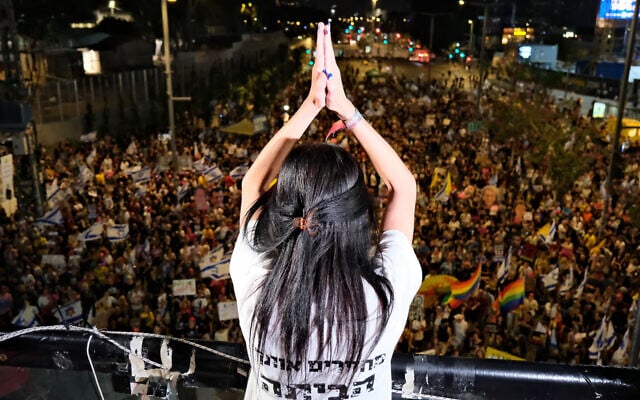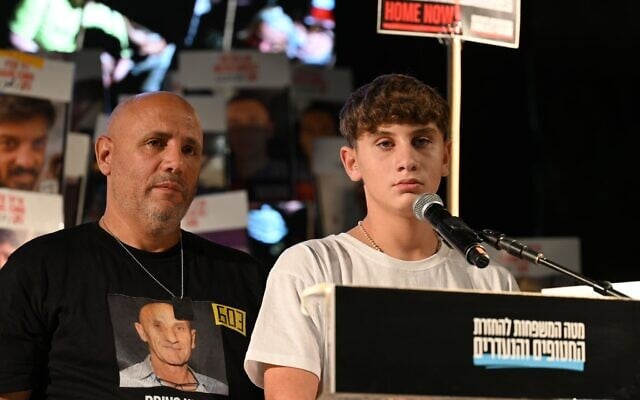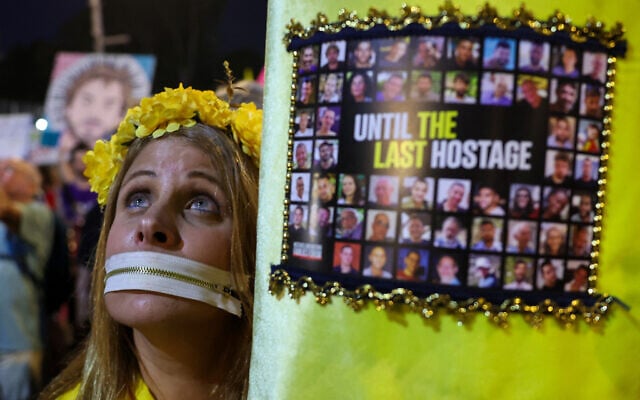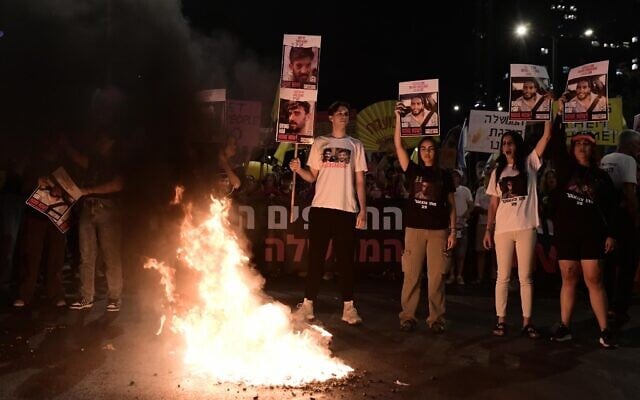


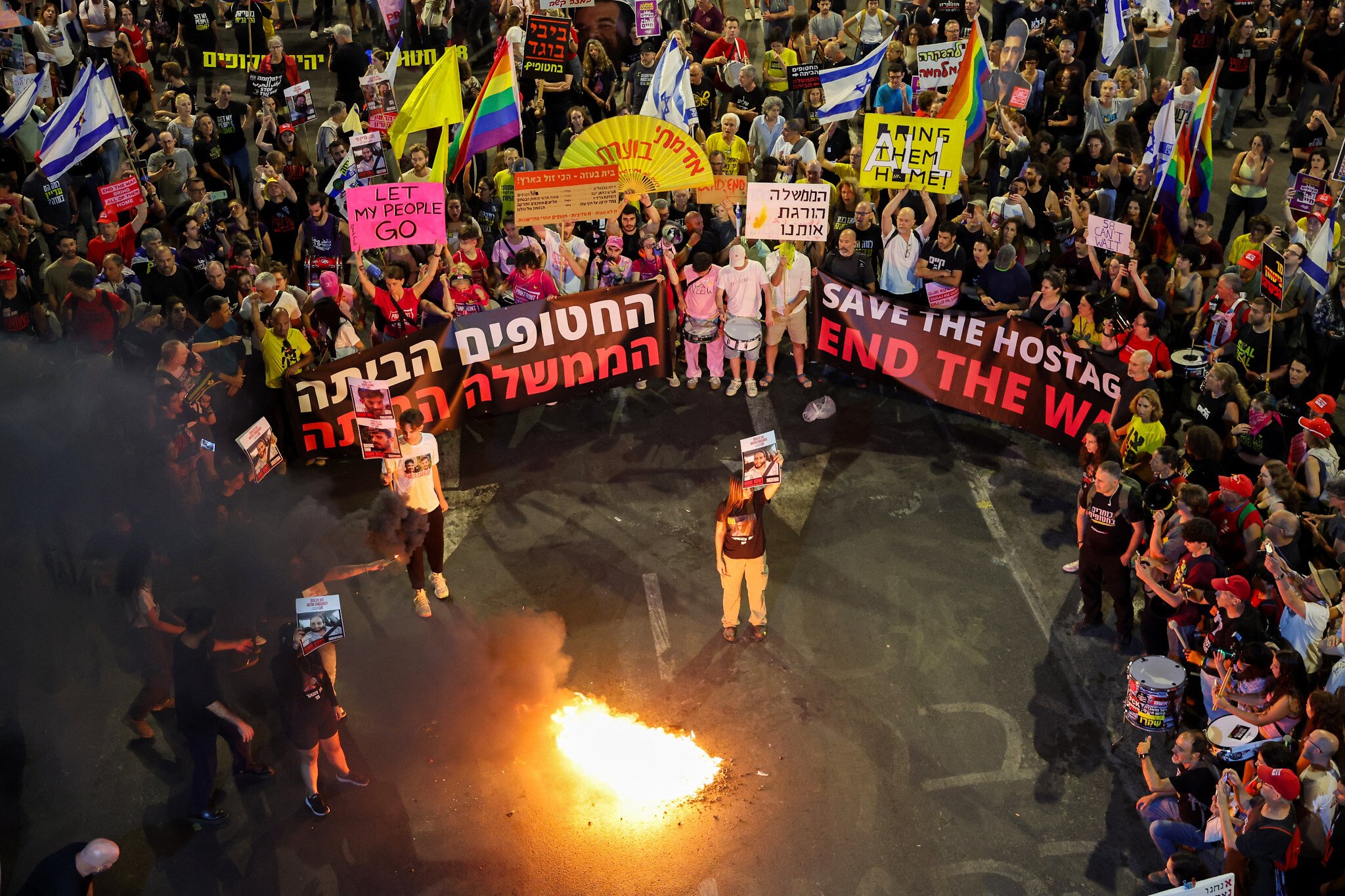
Thousands of people rallied in cities across Israel on Saturday night to protest against Prime Minister Benjamin Netanyahu’s government and for the return of the remaining hostages held by Hamas in Gaza.
The protests, which take place weekly, were held this week against the backdrop of a new ceasefire and hostage deal proposal put forward by the US, and Hamas’s response to the offer, which was deemed “totally unacceptable” by US special envoy Steve Witkoff.
Ahead of the main protests on Saturday evening, a group of hostages’ families warned in their weekly press conference that the temporary deal on offer would lead to the deaths of those left behind.
Relaying the urgency of the situation, Einav Zangauker, mother of hostage Matan Zangauker, slammed Netanyahu for only seeking partial deals rather than a comprehensive, one-off agreement, and warned that it would be “a death sentence for hostages that remain behind.”
She said she discovered earlier this week that Matan miraculously escaped bombing several times, “and in one case, almost suffocated to death from toxic gases in a tunnel that was bombed and collapsed.”
Yehuda Cohen, father of hostage Nimrod Cohen, said he feared his son, an IDF soldier, would be left behind under the current proposal.
“He is likely to pay the price of Prime Minister Netanyahu’s insistence not to end the war,” Cohen said, adding: “Netanyahu is abandoning my son and is shattering the Israeli ethos for political reasons.”
Later in the evening, at the rally at Tel Aviv’s Hostages Square, which markets itself as apolitical, the young sons of a slain captive issued a heartfelt appeal for the return of their father’s body.
“I need to know he’s here so I can get back to my life,” said Or Yaakov, who, along with his father Yair and brother Yagil, was taken hostage from Kibbutz Nir Oz on October 7, 2023.
Yair was killed during the assault and his body remains in Gaza, while Or and Yagil were released during a weeklong truce in November 2023.
“Why have we been waiting over 600 days just to bury him?” asked Or.
Or, who was 16 years old when he was taken, said his captors initially bound him because they believed he was an IDF soldier.
“I cried. I thought about my mother, my father, my home,” he said. “I asked myself: What if Dad’s in captivity? What if he’s not alive?”
“Only two months after we were returned did we learn he had been murdered,” he said.
Yagil, who was 12 when he was kidnapped, told the crowd of supporters that “for the entire captivity, I was alone with two terrorists.”
“I was nervous, sad, didn’t eat anything. They got annoyed, took a big plank and said, ‘If you don’t stop crying, we’ll take this and beat you with it until you stop,’” he said, quoting his captors in Arabic.
“I didn’t stop, because a 12-year-old has no clue what’s going on. So they kept beating me until I was in pain and screamed, ‘Stop!’” he continued, quoting himself in Arabic as well.
Even though he has been free for well over a year, Yagil said he still feels his captivity: “The shackles on my hands, the burns, the smell of smoke, bruises all over my body.”
“Please, pray, fight, scream,” he said. “We won’t be silent until my dad and all the hostages are back.”
Across the way from Hostages Square, some 1,000 anti-government protesters gathered at the Begin Road entrance to the IDF headquarters, where they crowded in to listen to Michel Illouz, the father of slain captive Guy Illouz, who met with Netanyahu earlier this week.
He claimed that the premier was willing to hurt the captives and was inciting violence within Israeli society, while weakening Israeli democracy.
Illouz said that in the meeting on Thursday with the premier and eight other hostage families, he asked how the current truce-hostage proposal in Gaza was any different from the previous one, which was signed in January and fell apart in early March after its first phase.
“In the last deal, too, you had no intention of progressing to the second [phase],” which would have required Israel to withdraw from the Strip, Illouz said he told Netanyahu. “You’re basically giving up and are willing to sacrifice my son.”
He said he also accused Netanyahu of sowing tensions among the hostage families by deciding which of their loved ones would be included in a deal, in a manner resembling another “Schindler’s List,” in which some of the remaining living hostages would be chosen for life, and the others sentenced to death. That was a reference to the famous list, compiled by Nazi party member Oskar Schindler during World War II, of Jews he went on to save.
“When I got no answer,” Illouz said, he told Netanyahu: “I can handle the loss of my son — what I can’t handle is what you are doing to us, Israeli society. You’re sowing discord among us… You’re causing wars within our nation. You need to stop playing your coalition games.”
“Of course, I got no answer,” he added.
To applause, Illouz said he’s “very worried for the future of the State of Israel… which becomes more dictatorial every single day.”
“The Israeli government is carrying out a military operation that could put the hostages’ lives at risk,” he said. “Is that moral? Is that human? Is that Jewish? Is that Israeli?”
The new hostage deal proposal presented to both Israel and Hamas by US envoy Steve Witkoff in recent days would see the release of 10 living Israeli hostages and the return of the bodies of 18 deceased hostages — around half of the living hostages and half of those no longer alive — in exchange for a 60-day ceasefire during which negotiations would be held regarding the return of the other captives and an end to the war.
The outline has been criticized by the families of the hostages, who fear their loved ones being left behind by yet another partial deal. On Saturday evening, however, Channel 12 reported that Israeli officials involved in the talks told the families that if the deal goes ahead, it would ultimately lead to the release of all remaining hostages.
Following Illouz’s speech and remarks from several other relatives of hostages, protesters on Begin Road briefly attempted to light a bonfire in the middle of the street. It sent up a large column of dark smoke, but was swiftly extinguished by police.
In a marked departure from recent weeks, the Begin Road demonstration was not preceded by a separate anti-government rally at the nearby Habima Square.
There was similarly an absence of protesters on Kaplan Street, where left-wing protesters have held a silent vigil each Saturday night for the Gazan children killed by Israel since the end of the last ceasefire with Hamas on March 18.
There are currently 58 hostages held in Gaza, including the bodies of at least 35 confirmed dead by the IDF, and 20 hostages who are believed to be alive. There are grave concerns for the well-being of three others, Israeli officials have said.
Hamas released 30 hostages — 20 Israeli civilians, five soldiers, and five Thai nationals — and the bodies of eight slain Israeli captives during a ceasefire between January and March, and one additional hostage, a dual American-Israeli citizen, in May as a “gesture” to the United States.
The terror group freed 105 civilians during a weeklong truce in late November 2023, and four hostages were released before that in the early weeks of the war. In exchange, Israel has freed some 2,000 jailed Palestinian terrorists, security prisoners, and Gazan terror suspects detained during the war.
Eight hostages have been rescued from captivity by troops alive, and the bodies of 41 have also been recovered, including three mistakenly killed by the Israeli military as they tried to escape their captors, and the body of a soldier who was killed in 2014.
The body of another soldier killed in 2014, Lt. Hadar Goldin, is still being held by Hamas, and is counted among the 58 hostages.

